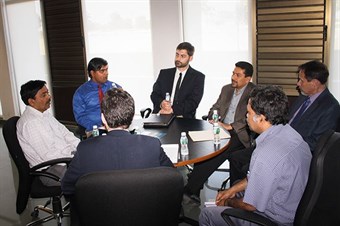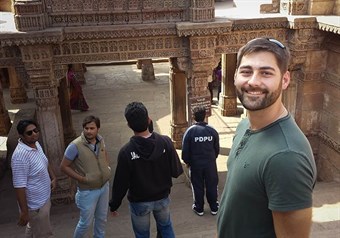From January 15 through February 16, 2014, nuclear engineering Ph.D. student Mathew Swinney presented a series of 27 lectures on nuclear safeguards and security to a group of 11 first-year master's degree students at Pandit Deendayal Petroleum University (PDPU) in India. The program is primarily supported by the U.S. Department of State through the Partnership for Nuclear Security (PNS) and Texas A&M University through the Nuclear Security Science and Policy Institute (NSSPI). This is the third time that NSSPI has sent a Ph.D. student to PDPU to present lectures on nuclear safeguards and security. 
The intent of the program is to introduce the PDPU students to nuclear security topics that are not currently covered in their university's nuclear engineering curriculum, but are considered to be of vital importance to India's next generation of nuclear professionals. The overwhelming majority of the lecture material presented at PDPU was adapted from three courses taught annually at Texas A&M by NSSPI faculty: Nuclear Nonproliferation (NUEN 650), Nuclear Fuel Cycles and Safeguards Systems (NUEN 651), and Nuclear Security System Design (NUEN 489). Some material from the Nuclear Materials Measurements course (NUEN 605) was also incorporated into the curriculum.
Swinney's interaction with PDPU faculty during his trip also served to help their program begin to incorporate nuclear safeguards and security material into their own curriculum. Because PDPU has had the unique privilege of collaborating with NSSPI for several years, they are expected to become a center of expertise in India with regard to nuclear security and safeguards. During the course of the lecture series, PDPU also hosted Mr. Daniel Miller from PNS, NSSPI faculty member Dr. Sunil Chirayath, and Dr. Robert Finch from Sandia National Laboratories who met with PDPU faculty to discuss further collaborations between PNS, NSSPI, Sandia, and PDPU. Texas A&M and PDPU signed a Memorandum of Agreement in January 2013 to support interactions between PDPU and the Texas A&M Department of Nuclear Engineering, NSSPI, and the Nuclear Power Institute (NPI).
 Mathew Swinney is a Ph.D. student in the Texas A&M Department of Nuclear Engineering and NSSPI, working with Dr. Chirayath on research related to the experimental and computational assessment of unique forensics signatures in plutonium from uranium irradiated in fast reactor blankets. His research is sponsored by the National Science Foundation and the Domestic Nuclear Detection Office (DNDO) under their Academic Research Initiative.
Mathew Swinney is a Ph.D. student in the Texas A&M Department of Nuclear Engineering and NSSPI, working with Dr. Chirayath on research related to the experimental and computational assessment of unique forensics signatures in plutonium from uranium irradiated in fast reactor blankets. His research is sponsored by the National Science Foundation and the Domestic Nuclear Detection Office (DNDO) under their Academic Research Initiative.